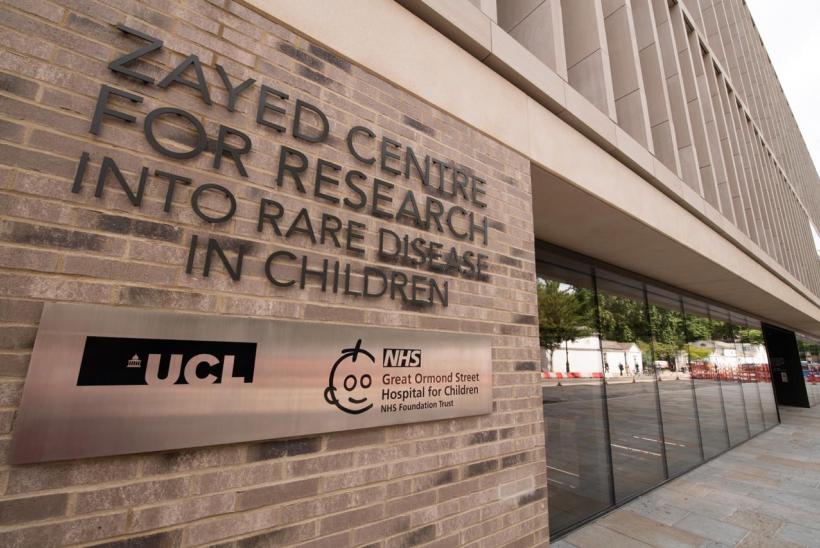GOSH celebrates second anniversary of Zayed Centre for Research into Rare Disease in Children
To celebrate its recent second birthday, we’re looking back at a remarkable two years at the Zayed Centre for Research into Rare Disease in Children.
View our film to see what has been achieved in the last 24 months.
The building brings together a unique collection of teams to facilitate the very best care, supported by cutting-edge research. It has an outpatients section (Falcon) on the ground floor while a one-of-a-kind laboratory in a dropped floor is home to the researchers that work on those diseases.
The research teams can see patients through the huge windows as they come and go and the patients and families can watch the teams working diligently to find better cures and treatments for children at GOSH, and worldwide.
Higher up, the building houses state of the art labs that can create treatments that will be given directly to patients at GOSH.
More than a hospital
While 105,000 patients have come through the doors since 2019, the Centre has also been involved in several globally significant research developments , hosted some very important visitors and is on track to become a central hub for vector manufacture following the announcement of a new partnership.
The Zayed Centre for Research opened shortly before the COVID-19 pandemic struck and, due to its specialist facilities, it was soon playing an instrumental role in the world’s first human challenge study of COVID-19. The study aims to establish the smallest amount of virus needed to cause infection, giving doctors and scientists greater understanding of COVID-19 and helping to support the pandemic response by aiding vaccine and treatment development.
It has also been an exciting time for gene therapy. July 2021 marked 20 years since the first patient was treated with gene therapy at GOSH and much of the pioneering gene therapy research at the hospital now takes place at the Zayed Centre for Research. Among those leading the clinical trials at the Centre are Professor Claire Booth who recently celebrated the successful results of a stem cell gene therapy clinical trial for a form of severe combined immunodeficiency called ADA-SCID in a joint study with UCLA. Of the 50 patients treated in the trial, 48 are no longer showing symptoms of the disease.
Meanwhile Professor Manju Kurian, who discovered the brain disorder dopamine transporter deficiency syndrome (DTDS) in 2009, has led development of a potential gene therapy cure for the disease. Professor Kurian said: “Being in the Zayed Centre has been absolutely life-transforming for both me and my researchers. We answer the questions that families ask us: why has my child got this condition, how has this happened and what can you do to make my child’s life better? And being in the Zayed Centre has allowed us to answer them. We have the most amazing laboratory space, we have state-of-the-art tissue culture facilities and we are in a milieu of other researchers who have the same goal, propelling us forward for these children.”
GOSH’s credentials as a global leader in gene therapy have also led to a new partnership with ViroCell Biologics, a global expert in vector manufacture, which going forward will see the Zayed Centre for Research become a central hub for the production of vectors - the gene therapy ‘delivery system’ that takes the working gene into living cells.
In September, His Highness Sheikh Mohamed bin Zayed, Crown Prince of Abu Dhabi, visited the Centre along with the UK's Secretary of State for Health and Social Care and Sajid Javid, and the Secretary of State for Education, Nadhim Zahawi. The group toured the facility, meeting researchers and clinicians who briefed them on how they work to diagnose, treat and cure rare diseases in children.
And in November, a team from the Abu Dhabi Stem Cell Centre met with researchers and clinicians working on a number of different disease groups to hear about their work and consider areas for future collaboration.
Mat Shaw, Chief Executive, GOSH, said: “The Zayed Centre for Research has proved to be an invaluable addition to the GOSH campus, providing us not just with space to help more children, but the superior facilities required to keep us at the forefront of developing new treatments for our patients. It has only been open for a short time, but it has already become a global resource and transformed what we believe we can achieve in the process.”
The Zayed Centre for Research was made possible thanks to a transformative £60 million gift from Her Highness Sheikha Fatima bint Mubarak, wife of the late Sheikh Zayed bin Sultan Al Nahyan, founding father of the United Arab Emirates, in 2014. We are also grateful to Research England, The Wolfson Foundation, John Connolly & Odile Griffith and the Mead Family Foundation whose generous support contributed to the creation of the Zayed Centre for Research. The Centre is a partnership between Great Ormond Street Hospital, UCL and Great Ormond Street Hospital Children’s Charity.

